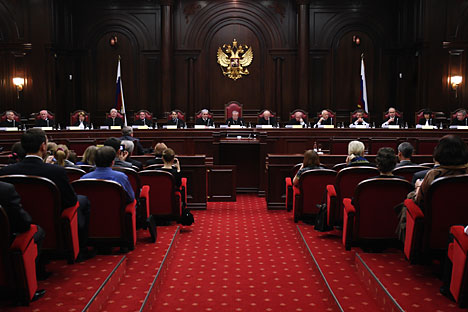Russia lagging in HIV vaccine race

An estimated $1.5 billion is needed to end the HIV epidemic in Russia
ShutterstockA lack of funds is delaying the rollout of two promising Russian anti-HIV vaccine hopefuls which have already completed important stages in clinical trials, the latest of which was done this February. Both options have been continuously mired by lack of funds, pushing a potential rollout further and further into the future.
Russian media, meanwhile, reported earlier this week that some pharmaceutical companies have asked the Russian government to officially declare an HIV and hepatitis C epidemic; this would allow mandatory licencing and production of antiviral drugs which are still protected by patents.
With little state support available, scientists and healthcare professionals find themselves battling over money and facing absurd tradeoffs between expanding access to antiretroviral drugs, currently around a dismal 20 percent, and investing in vaccines. An estimated $1.5 billion is needed to end the epidemic in Russia, with just about one fifth of that sum currently earmarked for 2016.
A not so dynamic duo
Russia currently is developing two of its own projects: a DNA-based vaccine being developed in Saint Petersburg and one called CombiHIV Vac, from the Vector biotechnology institute in Novosibirsk. A third Moscow-based project, HIVREPOL, once hailed as very promising, has apparently lost traction.
The two prospective Russian research vaccines that are still undergoing tests have their own unique way of battling HIV, a virus notorious for mutating quickly and attacking the very system that is supposed to protect the body. DNA-4 is basically a ‘composite sketch’, a set of four artificial genes from the virus intended to launch a targeted immune response. And CombiHIV Vac is more of a multi-tool with two complementing parts that try to do the same.
Stage II of clinical trials for DNA-4 in 54 patients was completed in February and, according to Andrey Kozlov of the Biomedical Centre in Saint Petersburg, the results warrant moving further. CombiHIV Vac was cleared for stage II trials over two years ago but testing cannot proceed without funding.
Patchy funding makes bringing vaccines to the market, or any research for that matter, much harder. As Kozlov said, you can’t really keep a research team together when there are ‘three or five year gaps’ between consecutive stages of development and testing.
Russian groups are not part of any major HIV vaccine collaborations, so they cannot leverage their support either. Yegor Voronin of Global HIV Vaccine Enterprise, an umbrella coalition on vaccine development, says Russian scientists are pursuing specific avenues set out years ago, whereas global collaborations tend to focus on looking for newer, more promising approaches. Both vaccines have been in development since the late 1990s.
Time is running out
The matter is time-sensitive for many reasons. DNA-4 specifically targets HIV-1 subtype A, a subtype of the virus that, until recently, dominated former Soviet countries as well as central and eastern Africa. State data now shows that it is losing ground to other subtypes, mainly through global migration. So, as Vadim Pokrovsky, head of the federal AIDS centre remarked, such subtype-specific vaccines may soon be of very limited use for the country.
Meanwhile, elsewhere in the world, RV144, a first in HIV vaccine development, will go into large-scale efficacy testing this year. RV144 is a mix of two vaccines quite similar to those developed in Russia, and it has the potential to become the first regional HIV vaccine, to be used in southern Africa. Other promising approaches at earlier stages include using broadly neutralizing antibodies.
Interestingly, the global window for HIV vaccine development is closing too, albeit slowly enough for scientists to still hope to get through. Voronin explained that, as more and more countries move to pre-exposure prophylaxis, or PrEP, a strategy that involves individuals at a very high risk of infection taking antiretroviral drugs as a means of preventing HIV infection, scientists will have an increasingly harder time finding enough participants for clinical trials.
An excited user on one of the largest Russian HIV online forums, who claims to have taken part in stage II trial for DNA-4, said she hoped that “if all goes well and corruption does not win, everyone will get [the vaccine]!”
These are high hopes because, according to Pokrovsky, the brand new 2020 strategy to fight HIV/AIDS in Russia recently presented to the Russian government, fails to provide concrete support for research. Indeed, the one time the word ‘vaccine’ is mentioned in the current draft document refers to barriers in the development of one.
All rights reserved by Rossiyskaya Gazeta.
Subscribe
to our newsletter!
Get the week's best stories straight to your inbox

